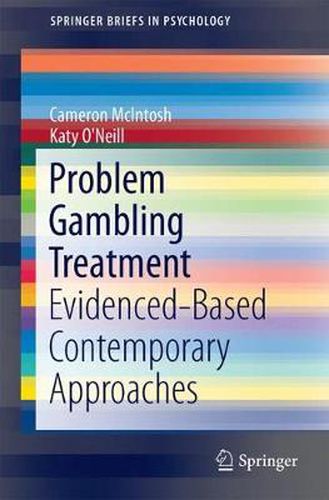Readings Newsletter
Become a Readings Member to make your shopping experience even easier.
Sign in or sign up for free!
You’re not far away from qualifying for FREE standard shipping within Australia
You’ve qualified for FREE standard shipping within Australia
The cart is loading…






This title is printed to order. This book may have been self-published. If so, we cannot guarantee the quality of the content. In the main most books will have gone through the editing process however some may not. We therefore suggest that you be aware of this before ordering this book. If in doubt check either the author or publisher’s details as we are unable to accept any returns unless they are faulty. Please contact us if you have any questions.
This international survey addresses gaps in the knowledge base on problem gambling, emphasizing evidence-based best practices for working with this diverse and notably resistant client population. A detailed introduction offers current findings on behavioral, affective, and neurological manifestations of disordered gambling, with prevalent types of resultant psychological, financial, and social harm. The book’s conceptual discussion examines clinical and sub-clinical presentations as well as the complex interplay of psychological and social factors that create barriers to seeking help. And on the practical side, up-to-date chapters detail widely-used and newer treatment options for compulsive gambling with the best chances of reducing treatment non-compliance and post-treatment relapses, including:
*
Psychoeducation.
*
Motivational interviewing.
*
Cognitive behavioral therapy.
*
Metacognitive and mindfulness approaches.
*
Acceptance and Commitment Therapy.
*
Dialectical Behavior Therapy.
*
Schema therapy.
*
Pharmacology.
*
Relapse Prevention.
Evidence-Based Treatments for Problem Gambling is a ready source of insights, data, and strategies for counselors working in problem gambling treatment centers, and for psychologists and counselors operating in public or private practice who see individuals with problem gambling as a primary or comorbid presentation. Researchers, lecturers, and treatment clinic managers will find this presentation both informative and immediately useful.
$9.00 standard shipping within Australia
FREE standard shipping within Australia for orders over $100.00
Express & International shipping calculated at checkout
This title is printed to order. This book may have been self-published. If so, we cannot guarantee the quality of the content. In the main most books will have gone through the editing process however some may not. We therefore suggest that you be aware of this before ordering this book. If in doubt check either the author or publisher’s details as we are unable to accept any returns unless they are faulty. Please contact us if you have any questions.
This international survey addresses gaps in the knowledge base on problem gambling, emphasizing evidence-based best practices for working with this diverse and notably resistant client population. A detailed introduction offers current findings on behavioral, affective, and neurological manifestations of disordered gambling, with prevalent types of resultant psychological, financial, and social harm. The book’s conceptual discussion examines clinical and sub-clinical presentations as well as the complex interplay of psychological and social factors that create barriers to seeking help. And on the practical side, up-to-date chapters detail widely-used and newer treatment options for compulsive gambling with the best chances of reducing treatment non-compliance and post-treatment relapses, including:
*
Psychoeducation.
*
Motivational interviewing.
*
Cognitive behavioral therapy.
*
Metacognitive and mindfulness approaches.
*
Acceptance and Commitment Therapy.
*
Dialectical Behavior Therapy.
*
Schema therapy.
*
Pharmacology.
*
Relapse Prevention.
Evidence-Based Treatments for Problem Gambling is a ready source of insights, data, and strategies for counselors working in problem gambling treatment centers, and for psychologists and counselors operating in public or private practice who see individuals with problem gambling as a primary or comorbid presentation. Researchers, lecturers, and treatment clinic managers will find this presentation both informative and immediately useful.